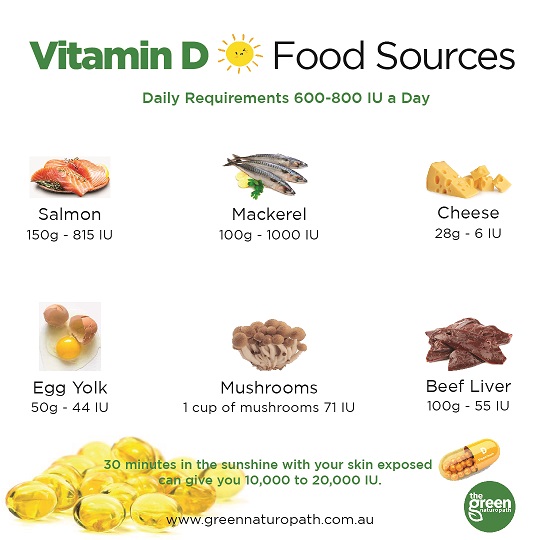

Every year during the cooler months we run the risk of becoming to low in vitamin D. Often not talked about this vitamin deserves to be in the spot light.
It has been shown if you have circulating serum levels less than 25(0H)D you are more at risk of respiratory tract infections and lower moods. Vitamin D is obtained from sun exposure, available in some foods and is activated in the liver and the kidneys to obtain the final metabolite, known as calcitriol.
Vitamin D is a fat-soluble vitamin, which means it dissolves in fat better than water. It is present in some foods and has many health benefits.
Vitamin D health benefits
Vitamin D activates many enzymes in the body, and it is very important for a variety of functions. The more important are as follows:
- Bone health: Vitamin D is advertised for strong bones and teeth, and it is surely involved in calcium absorption and metabolism. Vitamin D helps the body absorb calcium from the diet, so your body doesn’t have to steal it from your bones and weaken their structure. This vitamin is also important to keep your blood levels of phosphorus, another mineral that contributes to bone health.
- Immune health: Vitamin D modulates two different immune responses that protect the body from environmental harm. One of them is called innate immunity, and it is the type of immunity that protect us from microbes regardless of their type. The other is called adaptive immune response, and it is more specific and personalized for each bacteria or virus. Through antibodies in the blood, it detects invading pathogens making them an easy target to recognize and attack.
- Mental health: Vitamin D goes smoothly through the blood-brain barrier, reaches the brain, and stimulates receptors in the neurons and other brain cells. That’s why in winter times, when sun exposure is lower and vitamin D plummets, people have lower serotonin levels and a depressed mood in a syndrome known as Seasonal Affective Disorder.
With so many health functions, it is clear why people care so much about their vitamin D levels. But, can we actually suffer from vitamin D deficiency?
Vitamin D deficiency
Since vitamin D can be synthesized by the body and taken by foods, you would think that deficiency is very rare, but it’s not. People who are not exposed to sunlight may have a deficiency if they don’t consume vitamin D supplements or foods.
Factors that might increase your risk of a Vitamin D deficiency:
- Shift workers
- Office workers
- People who work from home
- People living in northern latitudes
- Dark-skinned individuals
- People with a body mass index over 30
If you marked one of the bullet points above, you may need to get your vitamin D checked, especially if you develop deficiency symptoms.
As you have probably guessed, the most important symptoms of vitamin D deficiency have to do with bone health, immunity, and mental health. The most common symptoms of vitamin D deficiency include:
- Getting sick often
- Fatigue
- Depression
- Bone loss
- Muscle pain
- Bone and back pain
- Impaired wound healing
- Hair loss
Long term deficiency may cause bone pain and increased susceptibility to fractures. Older adults may also have cognitive impairments and are higher risk of cardiovascular disease.
Requirements and sources of vitamin D
To avoid a vitamin D deficiency, the recommended daily intake depends on the age, as follows:
- Up to 1 year old: 7.5 mcg (300 IU)
- 1 to 60 years old: 15 mcg (600 IU)
- Over 60 years old: 20-25 mcg (800-1000 IU)
The most widely available source is sunlight exposure. But be careful, don’t get a sunburn in your attempt to get enough vitamin D. 10 or 20 minutes of sunlight exposure is usually enough to get plenty of vitamin D for the whole day. 30 minutes in the sunshine with your skin exposed can give you 10,000 to 20,000 IU.
If you live in northern latitudes and in winter times, you may need to supplement or consume vitamin D-rich foods to get your 600- 1000 IU, including:
- Fatty fish, such as salmon, mackerel, and tuna - 150g of fatty fish - 815 IU
- Cheese - 28g - 6IU
- Eggs with their yolk - 50g - 44 IU
- Mushrooms charged in the sun - 1 mushroom 2 IU, 1 cup of mushrooms 71 IU
- Beef liver - 100g - 55 IU
- Fortified food products with vitamin D

Subscribe to keep up to date with more blogs like this
If you liked this blog don’t forget to subscribe to my email to receive exclusive regular free blogs, healing recipes and tips that feed the body. You will also recieve an exclusive pdf on how to alkalise the body to help prevent disease and a 7 day alkalising challenge: 
You might also be interested in:
Mushrooms in winter to boost your immune system.
MEDICAL DISCLAIMER
This content is for informational and educational purposes only. It is not intended to provide medical advice or to take the place of such advice or treatment from a personal physician. All readers/viewers of this content are advised to consult their doctors or qualified health professionals regarding specific health questions. The Green Naturopath takes no responsibility for possible health consequences of any person or persons reading or following the information in this educational content. All viewers of this content, especially those taking prescription or over-the-counter medications, should consult their physicians before beginning any nutrition, supplement or lifestyle program.
“The human body has been designed to resist an infinite number of changes and attacks brought about by its environment. The secret of good health lies in successful adjustment to changing stresses on the body.” – Harry J. Johnson
MEDICAL DISCLAIMER
This content is for informational and educational purposes only. It is not intended to provide medical advice or to take the place of such advice or treatment from a personal physician. All readers/viewers of this content are advised to consult their doctors or qualified health professionals regarding specific health questions. The Green Naturopath takes no responsibility for possible health consequences of any person or persons reading or following the information in this educational content. All viewers of this content, especially those taking prescription or over-the-counter medications, should consult their physicians before beginning any nutrition, supplement or lifestyle program.





